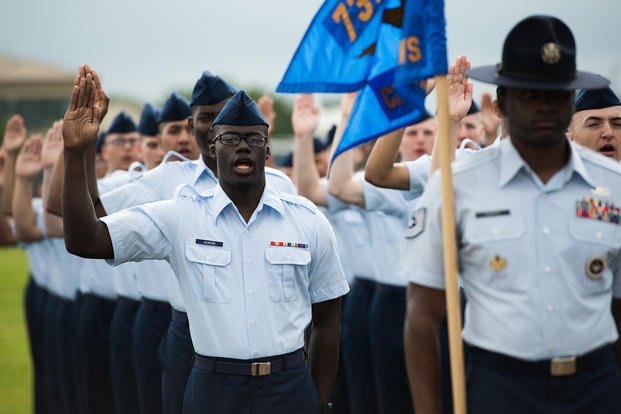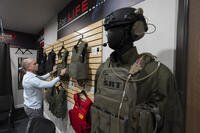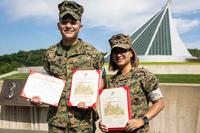What Is the US Air Force?
One of the five branches of the Armed Forces, the Air Force defends the United States through control and exploitation of air and space.
What Is the Cut-Off Age for Joining the Air Force?
Applicants must be between 17 and 39.
What's the ASVAB?
The ASVAB is a test that measures your aptitudes. It consists of 10 short individual tests covering word knowledge, paragraph comprehension, arithmetic reasoning, mathematics knowledge, general science, auto and shop information, mechanical comprehension, electronics information, numerical operations and coding speed. When you take the ASVAB before enlisting, not only do you receive scores on each of these individual tests, but several individual test results are combined to yield three academic composite scores: verbal, math and academic ability.
How Do I Prepare?
If you are in high school, your first concern should be education. Stay in school and graduate. Say no to drugs, keep yourself physically fit and stay out of trouble. Remember, take the hard classes (i.e., upper-level math, English and science, etc.) and you'll have more opportunities later on.
What Are Some Benefits of Joining?
- Steady income: You are paid twice a month, on the first and 15th, based on your pay grade and service requirements.
- Advancement: You are promoted based on job knowledge, performance, time in pay grade and service requirements.
- Paid vacation: You earn 2.5 days of paid vacation per month for a total of 30 days each year, up to 60 days.
- Training: You choose a career path based on your aptitude, physical abilities, security clearance, motivation and determination. All specialties are open to women, including combat roles.
- Health care: While on active duty, you will receive complete medical and dental care at no cost.
- Life insurance: Active-duty members select up to $200,000 in term life insurance for $18 per month.
- Allowances: You also may receive additional tax-free money for Basic Allowance for Housing (BAH) if government housing is not available; Basic Allowance for Subsistence (BAS), if government food facilities are not available in the area you are stationed; and a uniform allowance (for enlisted personnel only) to help maintain your uniform.
- Tax advantage: Only your basic monthly pay is subject to federal or state income tax.
- GI Bill: The Montgomery GI Bill and Post 9/11 GI Bill will help pay for college education or vocational training.
- Tuition assistance: While on active duty, you may continue your education and may be helped in defraying the cost of college-accredited courses.
- Additional benefits: There are exchange and commissary privileges, moving allowances, temporary lodging expenses, travel, survivor benefits, Veterans Affairs home loans and more.
Does the Air Force Take People with Prior Service?
Yes. The service accepts prior-service people but on a very limited basis.
What if I Am Not a US Citizen?
Only U.S. citizens or foreign nationals legally residing in the United States with an Immigration and Naturalization Service Alien Registration Card (or "green card" -- INS Form I-151/551) may apply. Applicants must speak, write and read English fluently.
Can the Military Help Me Obtain US Citizenship?
No. The military cannot assist foreign nationals in obtaining admittance into the United States.
What if I Live Overseas?
Regulations prohibit the forwarding of recruiting information through international mail, even to U.S. citizens living in foreign countries. Use our online form to reach a recruiter electronically.
How Long Is Boot Camp or Basic Military Training?
Air Force BMT is 8½ weeks long.
What Is BMT Like?
The United States Air Force basic military training program (often called BMT for short), consists of eight weeks of intense training (not including 4-5 in-processing days) intended to release the potential within an individual and produce the best airman possible.
Should I Do Anything Before I Go to BMT?
Yes. The more fit you are when you arrive, the better your chances are for avoiding injury and graduating from basic military training. Start out slowly and work out at least three times a week. Focus your training program on sit-ups, push-ups and running two miles.
How Do I Become an Officer?
You can become an officer through the U.S. Air Force Academy, ROTC, Officer Training School, the Airmen Education and Commissioning Program or direct commissioning programs. See our Air Force jobs page.
What Is the Airman Education and Commissioning Program?
The Airman Education and Commissioning Program is for active-duty airmen who have completed at least 45 semester hours of college credit. With such a head start, you may apply for this very competitive program. AECP gives active-duty airmen the opportunity to attend a full-time course of study in fields the Air Force determines are most critical -- such as computer engineering, computer science, electronic engineering, meteorology and nursing.
While enrolled in school, AECP participants are promoted to the grade of staff sergeant (E-5) and receive their full Air Force pay and benefits, plus money for tuition and books.
What Is the US Air Force Academy?
The U.S. Air Force Academy at Colorado Springs prepares young men and women to lead as Air Force officers. Cadets complete four years of studies leading to a bachelor of science degree. Emphasis is given to academics, military training, athletic conditioning, and spiritual and ethical development. Academics include classes in the basic sciences, engineering, the humanities and the social sciences. Within this framework, all cadets complete a core curriculum consisting of 91.5 semester hours. They can specialize in any of 25 academic majors.
How Do I Apply to the Academy?
There are five steps: knowing the basic requirements applying for a nomination, completing a candidate questionnaire, completing the candidate kit, securing a nomination from a congressional representative or other qualifying authorities, and completing testing.
General qualifications include:
- Between 17 but not yet 23 years of age by July 1 of year admitted
- A U.S. citizen at time of enrollment (exception: foreign students nominated by agreement between U.S. and another country)
- Unmarried
- Not pregnant or legally obligated to support a child
- An above-average high school or college academic record
- Strong performance on the standardized American College Testing (ACT) Assessment Program Exam or the Scholastic Aptitude Test (SAT)
- Be in good physical and mental health
- Pass a medical exam
- Above-average strength, endurance and agility
- Adequate performance on the USAFA physical aptitude exam
What Is Officer Training School?
Air Force Officer Training School prepares selected personnel in the fundamentals of leadership and basic military skills; instills professional ethics; evaluates leadership potential; and commissions those who qualify as second lieutenants in all 16 basic branches of the Air Force.
How Do I Qualify for OTS?
In general terms, an officer must be a college or university graduate before commissioning (except for enlisted soldiers on active duty), is trained by the Air Force to lead and manage, and can leave the military voluntarily if not under any officer service obligation at the time. Officers do not "enlist" in the Air Force and Air Force Reserve in the pure sense of the word, but individuals can compete for an enlistment option to go to Officer Training School to become a commissioned officer. To qualify, you must:
- Be a citizen of the United States
- Take the Air Force Officer Qualifying Test
- Pass the Air Force physical fitness test
- Score well on the SAT or ACT
- Have at least 90 college credits (if currently enlisted)
- Have a complete physical exam six months before applying.
Contact an Air Force recruiter for the latest OTS requirements.
What About Direct Commissions?
As a professional lawyer, engineer, member of the clergy or doctor, you also may qualify for a direct commission. Contact a recruiter for more information.
Does the Service Promote Enlistees to the Officer Ranks?
Yes.
How Do I Become a Pilot?
The Air Force trains pilots through its undergraduate pilot training program. Air Force pilots are generally officers who compete for the pilot training slots. Air Force flight training has strict vision requirements. The vision requirements are 20/50 for pilots and 20/200 for navigators. Vision for both must be correctable to 20/20. Applicants who have a history of photorefractive keratectomy (PRK), radial keratotomy (RK), or laser in-situ keratomileusis (LASIK) are ineligible for aviation duty.
What If I'm A Physician or Dentist?
The Air Force also is seeking qualified health professionals. For more information about medical programs, contact an Air Force recruiter.
Does the Air Force Have Reserve Opportunities?
Yes.
What Are The Qualifications to Join the Reserve?
You must be between 17 and 39 years old if you have no prior military service. Age requirements for health-care professionals and those with previous military experience vary. An Air Force Reserve recruiter can answer your age-related questions more thoroughly.
What Is a Drill?
This applies to Reserve and Guard duty. Drills are periods of inactive duty training (IDT), under orders, and are scheduled to augment training. No more than two drills can be performed on one calendar day, and each drill must be at least four hours long. Most units schedule multiple drills over one weekend each month (two drills Saturday and two drills Sunday).
What Training Will I Receive?
Depending on the program, you will receive boot camp and maybe technical training. Weekend or weekday drills are considered training. Active duty for training (ADT) is 12 days of active duty with your unit or in an Air Force school and is required annually.
What if I Have Problems Getting Time Off from My Employer to Fulfill My Military Service Obligations?
By law, as a member of the Reserve, you, upon request, must be granted a leave of absence to satisfy a requirement for military training. The Uniform Services Employment and Reemployment Rights Act requires employers to provide Reservists with time away from their jobs to perform military duty. However, you must notify your employer that you intend to take military leave. You must be reemployed after completion of your military duty and return to your job within a reasonable time. You must be treated as though you had never left employment, including schedule pay raises, promotions or credit for longevity or vacation. Your employer only has to hold a job open for 60 months if you accept voluntary orders. For additional information, see the USAF home page.
How Do I Choose My School?
Generally, you can attend any school you qualify for. The results of your ASVAB determine your qualifications.
Is Technical Training like Boot Camp?
No. This is training for a specialty you have chosen. It may involve work details and duty, but the main focus is on technical and professional training.
Will I Get Paid While in Training?
Yes, you will be paid for every day you serve according to published pay schedules for your pay grade, in addition to any temporary duty or travel allowances.
What Should I Ask My Recruiter?
Recruiters must present an accurate picture of service. You should be aware of all aspects of the military. Be sure you fully understand the enlistment contract. You should ask about:
- Details and qualifications for each specialty
- Films or videos about training and duties
- Boot camp
- Length and location of training
- Special enlistment programs
- Overseas assignments, remote and long duty
- Haircut and grooming standards
- Off-duty education and educational benefits
- Guaranteed training programs
Interested in Joining the Military?
We can put you in touch with recruiters from the different military branches. Learn about the benefits of serving your country, paying for school, military career paths, and more: sign up now and hear from a recruiter near you.















